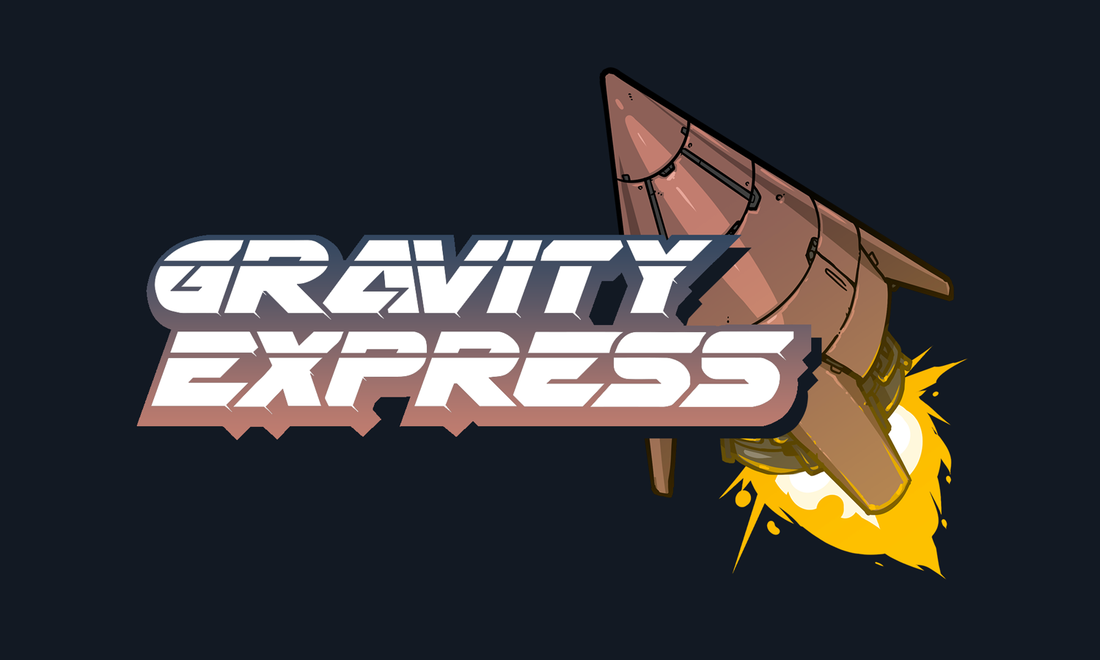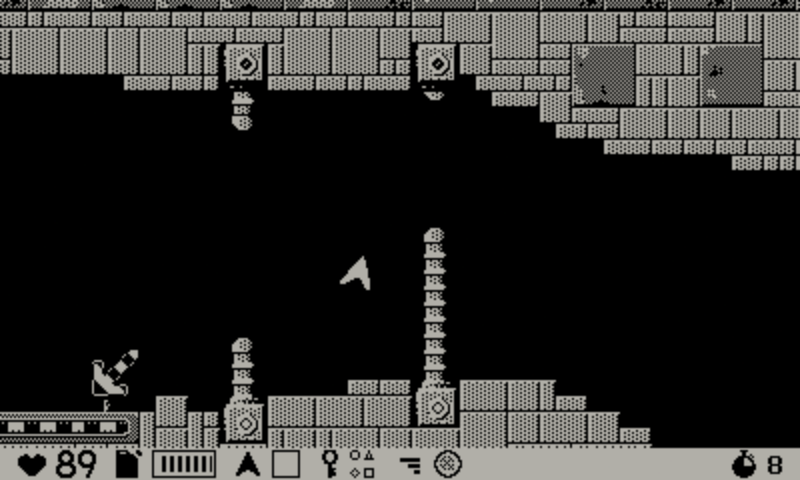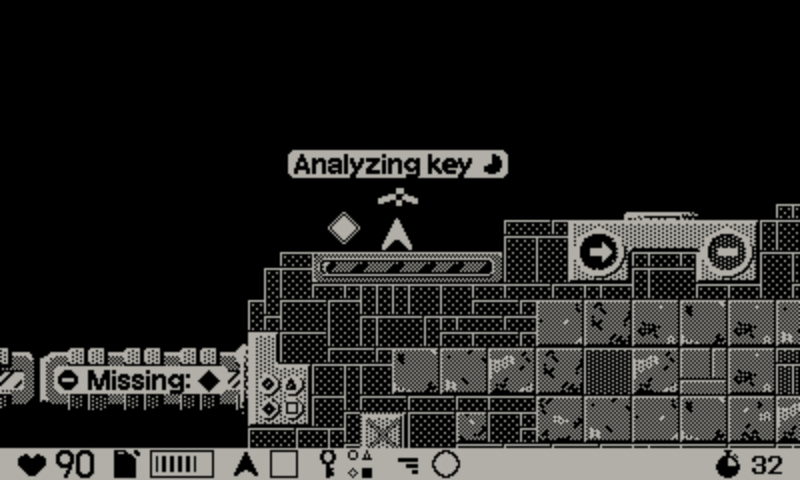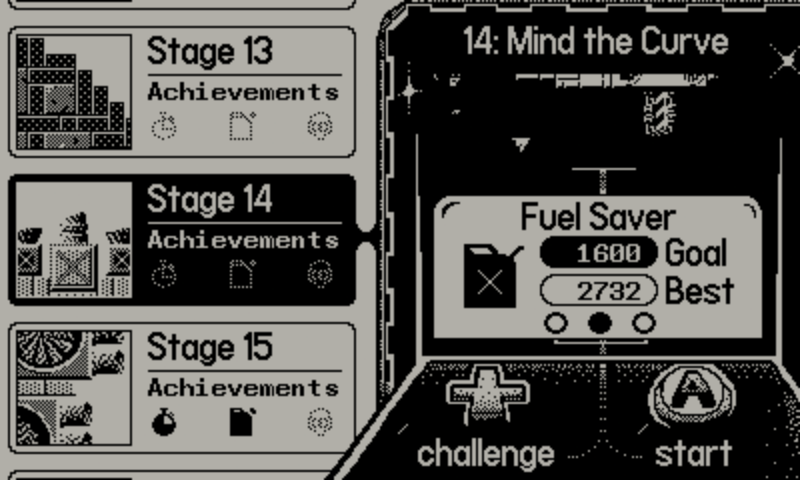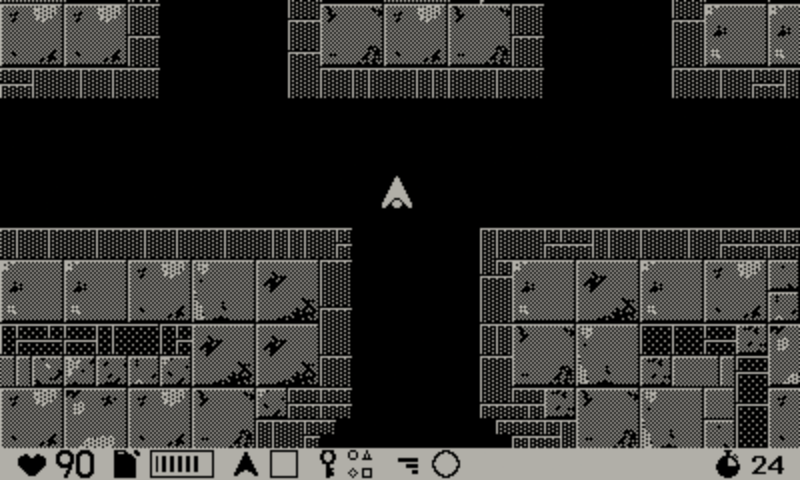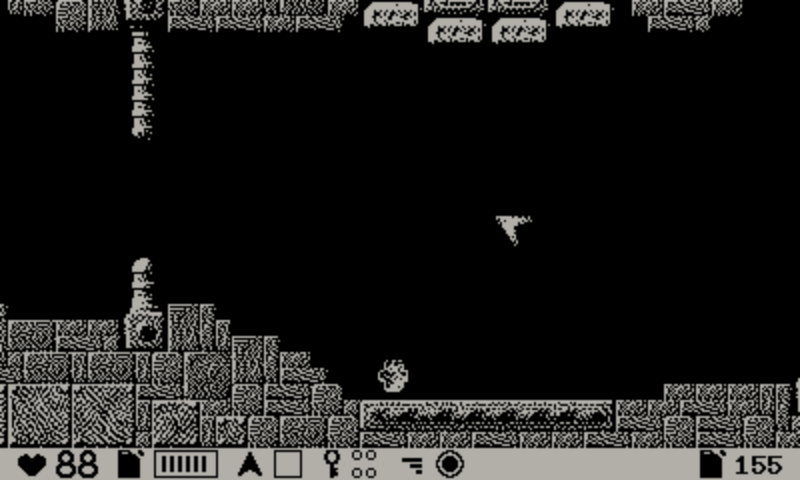GRAVITY EXPRESS (PD)
After four decades out of the limelight, the lunar lander genre has enjoyed a belated (and it has to be said, entirely unexpected) mini renaissance via homebrew projects, aftermarket releases and this excellent Playdate effort from Nino van Hooff. It’s about time, too, as the genre has plenty of potential still to be tapped. The central conceit is fiendishly simple, yet demands skill and nuance of control, and as Gravity Express highlights, there are ample possibilities for new gameplay challenges. GE is a blast from the past, one that embraces the spirit of its genre whilst also capitalising on the Playdate’s feature set. It’s an addictive, challenging game that’s a great fit for the portable system.
A stylish FMV opening sees the player inducted into the high-stakes ranks of a galactic delivery pilot. Well, a delivery pilot in training. Its 25 stages form the proving grounds for this exciting and unreasonably hazardous career path. Sounds simple, but for the player to succeed, you’ll need to master thrust controls in conjunction with manoeuvring your ship in tight spaces as well as keeping a clear mind for the more labyrinthine routes. Danger is everywhere: clip any part of the scenery and your ship will be destroyed instantly, whilst landing too quickly or at an angle will result in the same fate.
After four decades out of the limelight, the lunar lander genre has enjoyed a belated (and it has to be said, entirely unexpected) mini renaissance via homebrew projects, aftermarket releases and this excellent Playdate effort from Nino van Hooff. It’s about time, too, as the genre has plenty of potential still to be tapped. The central conceit is fiendishly simple, yet demands skill and nuance of control, and as Gravity Express highlights, there are ample possibilities for new gameplay challenges. GE is a blast from the past, one that embraces the spirit of its genre whilst also capitalising on the Playdate’s feature set. It’s an addictive, challenging game that’s a great fit for the portable system.
A stylish FMV opening sees the player inducted into the high-stakes ranks of a galactic delivery pilot. Well, a delivery pilot in training. Its 25 stages form the proving grounds for this exciting and unreasonably hazardous career path. Sounds simple, but for the player to succeed, you’ll need to master thrust controls in conjunction with manoeuvring your ship in tight spaces as well as keeping a clear mind for the more labyrinthine routes. Danger is everywhere: clip any part of the scenery and your ship will be destroyed instantly, whilst landing too quickly or at an angle will result in the same fate.
It may look simple, but Gravity Express demands concentration to unlock all of its rewards
On the surface, this lunar lander is entirely in keeping with the genre in its late-seventies pomp. However, a host of cool features aim to test the player. Controlling the ship itself requires a bit of finesse, but after a couple of levels to help you acclimatise, the game starts throwing into the mix directional air vents, steering-mangling magnets, tight bottlenecks and hatches opening only halfway. Some of the later levels (notably ‘A-maze-ing’) prove compelling for how little margin for error they present, with tight passageways demanding constant small adjustments and hold-you-breath moments as you aim to fit through narrow gaps. Special mention must go to the last mission, ‘Final Countdown’, which recalls Europe’s classic eighties track and features a fun, crank-operated launch sequence to end things on a flamboyant note.
It looks impressive, too. Whilst Gravity Express’ vision of the future may be a touch utilitarian thanks in part to the hardware, everything looks pleasingly neat. It may not be the most visually ambitious game the system has to offer, but it’s a lot tidier than most Playdate titles. The introduction video is fantastic, with recorded dialogue the icing on the cake. Menus are bold and easy to utilise, whilst a strident synth soundtrack proves a triumphant fit for the action.
It looks impressive, too. Whilst Gravity Express’ vision of the future may be a touch utilitarian thanks in part to the hardware, everything looks pleasingly neat. It may not be the most visually ambitious game the system has to offer, but it’s a lot tidier than most Playdate titles. The introduction video is fantastic, with recorded dialogue the icing on the cake. Menus are bold and easy to utilise, whilst a strident synth soundtrack proves a triumphant fit for the action.
Gravity Express sports an unrivalled array of options. Most notably, three different means of navigation. The D-pad, for those after a purist’s interpretation, gets the job done in a sturdy but unspectacular fashion. Giro control sees the player rotating the Playdate itself to change direction. This is pretty cool, though its sensitive nature, coupled with some lengthy levels, means you’ll need a strong pair of arms to stay the course! Fittingly enough, the best mode of control is that most unique to the Playdate: the crank. Gentle rotations make for responsive, accurate turns and not only is it a really satisfying way to pilot your ship, but it makes for an experience quite unlike anything else you’ll have played before. Add to this a variety of visual options, as well as moon, space and Earth physics and different playing speeds, and you have a remarkably customisable experience.
Little by little, the game tests the player more sternly. Stages are beautifully put together, forming an appreciable difficulty curve as levels offer more elaborate, technically challenging layouts that adopt different styles. Some are fairly rapid but require dexterity to avoid hazards, whilst others take several minutes and are more an exercise in concentration and planning. Twisty, maze-like layouts mingle with expansive environments that encourage more speed. Collecting cargo is key to finishing levels and often the order in which the player does this affects how quickly and effectively the end can be reached. The pace, technical nature and mood evolve throughout the game, and nearly all of the levels are a success.
Little by little, the game tests the player more sternly. Stages are beautifully put together, forming an appreciable difficulty curve as levels offer more elaborate, technically challenging layouts that adopt different styles. Some are fairly rapid but require dexterity to avoid hazards, whilst others take several minutes and are more an exercise in concentration and planning. Twisty, maze-like layouts mingle with expansive environments that encourage more speed. Collecting cargo is key to finishing levels and often the order in which the player does this affects how quickly and effectively the end can be reached. The pace, technical nature and mood evolve throughout the game, and nearly all of the levels are a success.
Versatility of design: whether its slow, twisty mazes or quicker, more expansive stages, Gravity Express is loads of fun
Excellent structuring ensures Gravity Express extracts plenty of lifespan from its 25 stages. Each offers three achievements to strive for: completing the stage within a time limit, without losing a ship, and with a set quotient of fuel usage. These are nothing revolutionary unto themselves but combine to add depth and challenge to levels, where they help extract improvement from the player. What could have been a very brief endeavour, given the immediacy of its gameplay, is good for 6-8 hours, which by the standards of the genre, is superb. All told, it deserves great credit for its versatility of control: it’s fantastic when developers take advantage of a system’s features. Better still, it’s an engaging challenge and loads of fun to play, and that’s why Playdate owners should seek it out.
|
|
VERDICT
"Gravity Express sports unrivalled versatility through its numerous methods of control. Most importantly, however, this lunar lander game is an engaging challenge and lots of fun to play." OVERALL: 8/10 |
OTHER OLD-SCHOOL SHOOT 'EM UP GAMES REVIEWED
